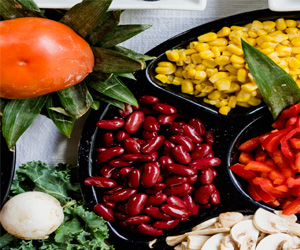


A Culinary Revolution For Health And Sustainability

Plant-based cooking has emerged as a popular and transformative culinary movement, emphasizing the consumption of plant-derived ingredients while minimizing or eliminating animal products. The beauty of plant-based cooking lies in its inclusivity - it's a style of cooking that can be enjoyed by people of all backgrounds, dietary preferences, and lifestyles. Let's explore the essence of plant-based cooking for all and its far-reaching benefits.
A Feast Of Variety
One of the standout features of plant-based cooking for all is its wide-ranging diversity. It embraces an array of ingredients, from fresh fruits and vegetables to whole grains, legumes, nuts, and seeds. This diverse palette allows for the creation of an expansive range of dishes, accommodating various tastes and cultural influences.
Cultural Inclusivity
Plant-based cooking respects cultural diversity and inclusivity, making it accessible to people from all walks of life. It seamlessly integrates with a plethora of global culinary traditions, enabling the preparation of familiar dishes and exotic creations. Whether you're a fan of Mediterranean cuisine, Asian flavors, or the richness of Indian spices, plant-based cooking offers a world of gastronomic possibilities.
Health And Well-being
Plant-based cooking for all focuses on nourishing the body and promoting well-being. These diets are known to reduce the risk of chronic diseases, such as heart disease and diabetes, and can contribute to weight management and overall vitality. Plant-based foods are rich in essential nutrients, vitamins, minerals, and antioxidants that support physical and mental health.
Eco-Friendly And Sustainable
Choosing plant-based options has far-reaching benefits for the environment. Plant-based diets have a significantly lower carbon footprint compared to diets that rely heavily on animal agriculture. By reducing the demand for meat and dairy, we contribute to sustainable farming practices and the conservation of natural resources, all while mitigating climate change.
Ethical Compassion
For many, plant-based cooking aligns with ethical and compassionate values. It offers a way to express kindness and empathy towards animals and fosters a sense of responsibility for their welfare. By reducing the consumption of animal products, plant-based cooking allows individuals to participate in more humane and compassionate choices.
Accessible To All Budgets
Plant-based cooking is not just for the elite; it is accessible to people from all income levels. Many plant-based staples are affordable, including beans, lentils, rice, and seasonal fruits and vegetables. This affordability ensures that plant-based eating is within reach for individuals and families seeking a more economical way to eat healthily.
Versatility For Every Occasion
Plant-based cooking is versatile, suitable for all occasions, from casual weeknight dinners to festive gatherings. It accommodates various cooking styles and dietary preferences, from raw vegan to flexitarian. You can enjoy plant-based breakfasts, pack plant-powered lunches, and savor sumptuous plant-based dinners.
Plant-based cooking for all is not a restrictive dietary trend; it is a culinary revolution that is accessible, inclusive, and beneficial to individuals, communities, and the planet. It celebrates the richness and diversity of plant-based ingredients, offers health benefits, and promotes sustainability. Whether you're looking for a more compassionate way to eat, a health-conscious lifestyle, or simply delicious and diverse meals, plant-based cooking has something to offer everyone. It's a movement that proves you can eat well, respect the Earth, and honor your ethical values, all while savoring the culinary delights of a plant-based world.






Understanding The Basics
 Bread And Baked Goods: Wheat-based bread, pastries, and cakes are rich in gluten.
Bread And Baked Goods: Wheat-based bread, pastries, and cakes are rich in gluten.
Pasta: Traditional wheat pasta is a gluten-containing staple.
Cereals: Many breakfast cereals are made from gluten-containing grains, though gluten-free alternatives are available.
A Flavorful Journey From Field To Plate
 Freshness: Farm-fresh ingredients are harvested or prepared at the peak of ripeness. This freshness imparts exceptional flavor and nutritional value to the food.
Freshness: Farm-fresh ingredients are harvested or prepared at the peak of ripeness. This freshness imparts exceptional flavor and nutritional value to the food.
Proximity: The journey from the farm to your plate is short, minimizing the time spent in storage or transportation. This close proximity ensures minimal loss of flavor and nutrients.
Minimal Processing: Farm-fresh ingredients are minimally processed, if at all. They retain their natural state and are free from the additives and preservatives commonly found in processed foods.
Transparency: The origins of farm-fresh ingredients are often transparent. Consumers can learn about the farming practices, visit the farms, and connect with the producers. This transparency builds trust and strengthens the farm-to-table connection.
A Recipe For Health And Sustainability
 Health Benefits: Organic cooking prioritizes the quality and nutritional value of ingredients. Here are some key health benefits associated with organic cooking:
Health Benefits: Organic cooking prioritizes the quality and nutritional value of ingredients. Here are some key health benefits associated with organic cooking:
Nutrient-Rich Ingredients: Organically grown foods tend to be richer in essential nutrients, such as vitamins, minerals, and antioxidants. This means that meals prepared with organic ingredients can provide a more substantial nutritional punch.
Avoiding Harmful Chemicals: Organic cooking eliminates the risk of ingesting synthetic pesticides and herbicides commonly found on conventionally grown produce. These chemicals have been linked to various health issues, making organic options a healthier choice.
Reduced Exposure To Antibiotics And Hormones: Organic meats and dairy products come from animals that are raised without antibiotics and synthetic hormones. By consuming organic animal products, you reduce your exposure to these potentially harmful substances.
Better For Allergies: Organic foods have been reported to be less likely to trigger allergies due to their lack of synthetic chemicals and genetically modified ingredients.
Sustainability And The Environment: Organic cooking is not only beneficial for your health but also for the planet. Sustainable farming practices that go hand-in-hand with organic cooking have several environmental advantages:
Nourishing Your Body One Sip At A Time
 Antioxidant Benefits
Antioxidant Benefits
Antioxidants are nature's superheroes when it comes to fighting off free radicals and preventing cellular damage. Nutrient-packed beverages frequently contain an abundance of antioxidants sourced from fruits, vegetables, and other plant-based ingredients. These antioxidants help protect our bodies from oxidative stress and reduce the risk of chronic diseases.
Weight Management And Digestive Health
Nutrient-packed beverages can be a valuable tool for those looking to manage their weight. A well-balanced smoothie or juice can provide satiety while keeping calories in check. Additionally, they often include dietary fiber, which supports healthy digestion and promotes a feeling of fullness.
Customization And Variety
One of the beauties of nutrient-packed beverages is their versatility. You can customize them to suit your taste and nutritional needs. Whether you prefer a green smoothie with spinach and kale for an extra boost of iron or a fruity blend to satisfy your sweet tooth, the options are endless. This flexibility makes it easy to find a combination that you truly enjoy while still reaping the health benefits.
A Path To Optimal Health
 The Role Of Vitamins
The Role Of Vitamins
Vitamins are involved in a multitude of physiological processes, including energy production, immune system function, and the maintenance of healthy skin, eyes, and bones. They act as cofactors in enzymatic reactions that are crucial for life. Each vitamin has specific roles and functions, and a deficiency in any of them can lead to various health problems.
Fat-Soluble vs. Water-Soluble Vitamins
Vitamins can be categorized into two groups: fat-soluble and water-soluble. Fat-soluble vitamins (A, D, E, and K) are stored in the body's fat tissues and liver. Excess amounts can accumulate, so it's essential to monitor their intake. Water-soluble vitamins (C and the B-complex vitamins, including B1, B2, B3, B5, B6, B7, B9, and B12) are not stored in the body, so regular intake is necessary to maintain optimal health.
The Importance Of A Balanced Diet
A balanced diet that includes a wide variety of foods is the most reliable way to ensure adequate vitamin intake. Fruits, vegetables, whole grains, lean proteins, and healthy fats should all be part of your daily menu.
 Fresh Ingredients As Key Players
Fresh Ingredients As Key Players
Flavorful plant-based cuisine places a strong emphasis on the use of fresh, seasonal ingredients. Fruits and vegetables in their prime, legumes, whole grains, nuts, and seeds form the foundation of these dishes. The freshness and quality of these ingredients not only enhance the taste but also provide a wealth of nutrients, vitamins, and minerals.
Spices And Herbs For Complexity
Spices and herbs are the secret weapons in crafting flavorful plant-based dishes. Ingredients like garlic, ginger, turmeric, cumin, coriander, and a variety of aromatic herbs are used to create layers of complexity in flavors.
A Culinary Revolution For Busy Lives
 <The Simplicity Of One-Pot Meals
<The Simplicity Of One-Pot Meals
One-pot meals, as the name suggests, involve cooking an entire dish in a single pot or pan. This approach significantly simplifies the cooking process, making it accessible to everyone, from seasoned home cooks to kitchen novices. It's a game-changer for those with busy schedules, as it offers a shortcut to hearty, flavorful meals without the need for an arsenal of pots, pans, and utensils.
Why One-Pot Meals?
Here are a few compelling reasons why one-pot meals have become a staple in many households:
1. Time-Saving: One-pot meals are champions of efficiency. By combining ingredients in one pot, you reduce the time spent on food preparation and cleanup, making these dishes perfect for weeknight dinners.
2. Versatility: From pasta dishes and stir-fries to stews and casseroles, the range of one-pot recipes is astonishing. Whether you're in the mood for something hearty and comforting or light and healthy, there's a one-pot recipe to suit your cravings.